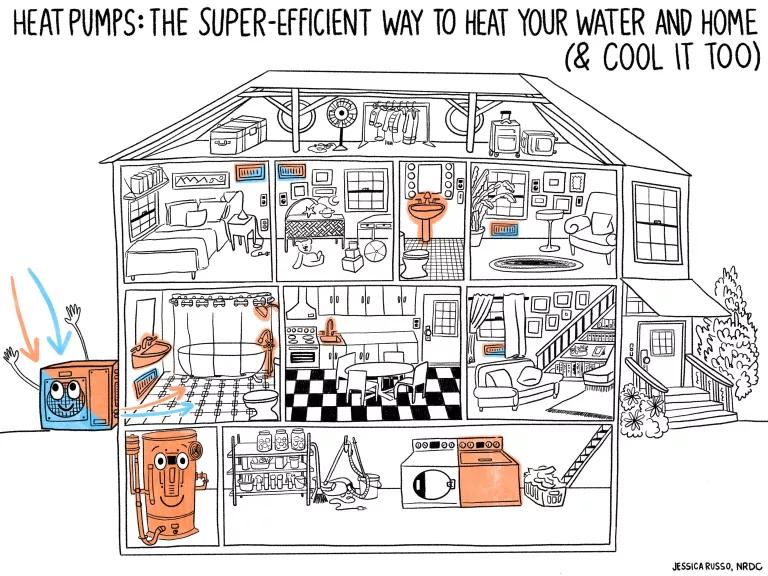Let’s Ride These Heatwaves with Heat Pump Technology

This weekend my family “sweltered” in place during a record West-wide heat wave while thunder and lightning cracked the skies and our utility threatened to shut off power. Ash is falling today on my neighborhood due to lightning-sparked wildfires. I can’t help feeling like the four horses of the apocalypse are trampling all over the California right now with these recent challenges piling on of the continued spread of COVID-19 and the country’s economic woes. I’m grasping for the silver lining on many levels, but at least one thing is clear—modern electric heat pumps are a climate-proof technology that can help Californians survive and thrive during these difficult times.
Heat pumps are a super-efficient electric technology for heating (and cooling) homes and heating water. They are a core technology for reducing the climate pollution coming from our homes and buildings. They also offer a tool to help families cope with heatwaves, poor air quality, and rolling blackouts because heat pumps offer affordable cooling, reduce air pollution, and provide grid flexibility.
Affordable Air Conditioning
Moving to super-high efficiency heat pump technology for water heating and space heating reduces climate pollution by avoiding the use of fossil gas (aka “natural” gas) or propane. But heat pumps also offer cooling using the same equipment—just press a button and you get a nice cool breeze while a heatwave rages outside. Moving from an old, inefficient air conditioner to a high-efficiency heat pump could reduce energy used for cooling by up to 50 percent (or even more if replacing an old window AC unit), helping to decrease strain on the grid during peak hours. In addition, with a heat pump, families that mostly need heating during the winter can also occasionally benefit from in-home cooling to protect against sudden and life-threatening spikes in temperature like we’ve seen this week in California.

Cleaner Air Inside Your Home
Heat pump appliances can also improve both indoor and outdoor air quality. They have filters that clean the air of particulate matter from fires, mold, and allergens while providing cooling or heating. And not burning fossil gas in homes offers huge air quality improvements by avoiding harmful emissions of nitrogen oxides (NOx) and other pollutants from gas combustion. A recent study from UCLA’s Fielding School of Public Health finds that replacing gas with efficient electric appliances in California homes would prevent about 350 premature deaths each year and produce $3.5 billion in annual health benefits from cleaner air.
Flexible Loads to Help Avoid Grid Outages
Heat pump water heaters (HPWHs) can also double as clean-energy batteries by storing water heated by emissions-free solar energy to use during times when the sun isn’t shining, reducing strain on the grid at key times to avoid outages. This enables homes to use the cleanest and cheapest electricity available to heat their water. A properly-sized HPWH can store enough hot water to meet household needs without recharging during peak times. This helps “shift” electricity demand away from peak usage hours, to hours when low-cost and emissions-free renewable electricity is abundant. The California Public Utilities Commission found that heat pump water heaters can provide effective, local energy storage to help balance the grid.
Power Outages Are Not Acceptable—or Inevitable
Rolling blackouts are not an acceptable or inevitable result of heatwaves. The recent blackouts were caused by a lack of planning and procurement for sufficient capacity to cope with increasingly extreme heat waves caused by climate disruption, as well as other factors. Super-efficient and grid-friendly heat pump technology is a part of the solution to cope with heatwaves in the future, along with better resource planning and increased investment in energy efficiency, storage, and other demand-shifting measures.

